Reading the Muslim Mind
Dublin Core
Title
Reading the Muslim Mind
Description
Once in a while a book comes along that can reshape the thinking of the world. One person at a time. "Reading the Muslim Mind" is just such a book. Dr. Hassan Hathout starts out from a simple observation--a lifetime of biculturalism (the Egyptian-born physician has lived in Britain and now resides in the USA) leads him to note that "Islam in the West is widely known for what it is not." This encyclopedic personality (doctor of medicine, thinker, speaker, poet) sets out to guide the reader on a comprehensive tour through Islam. For this voyage, he supplies a keen and lucid "anatomy" of the Islamic life. But more: he provides, with incisive clarity, the inner guidebook: he uncovers the tracing of the mind at work behind the practice, the spirit behind the letter, the rationale and the Ultimate Reason, God. For non-Muslims and what Dr. Hathout aptly calls the Judeo-Christian-Islamic world tradition at large, the trip proves illuminating and always thought-provoking. For Muslims, it will re-anchor and enrich their faith and offer vital and timely answers to up-to-the-minute dilemmas of life at the brink of the millennium. The book addresses key issues of our time from the Islamic perspective. Dr. Hathout in this wise, warm and inspiring work is speaking to the audience of humankind, in the Age of Selfishness, "Microtheism" and Godlessness. In his clarion call of hope, the author knows that when a "minimum critical mass turns to cooperation and understanding, real change is possible. To be known for what one really is, is nothing less than a human right, Dr. Hathout notes. Here then is Islam as it (really) is, and the world as it (really) can be. (Book jacket).
Creator
Hassan Hathout
Publisher
Plainfield, Ind. : American Trust Publications
Date
1995
Contributor
with a foreword by Ahmad Zaki Yamani
Text Item Type Metadata
Original Format
Book
Citation
Hassan Hathout, “Reading the Muslim Mind,” Humanities Hub, accessed February 25, 2026, https://humanitieshub.sdsu.edu/omeka/items/show/1765.

